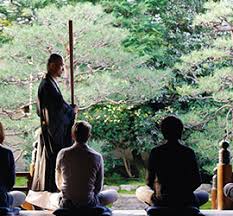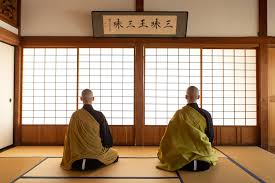自力本願の宗教、禅 Zen Self-motivated Religion
自力本願 Absolute self-reliance

Zen is a branch of Buddhism, and while other Buddhist sects are absolute dependence religion, Zen is a self-motivated religion that can be saved by one’s own rigorous training.
Rather than the study of scriptures and the practice of correct deeds and ritual services and Buddha worship Zen teaches that enlightenment can be reached through meditation through zazen.
禅は仏教の一派で、他の仏教宗派が他力本願であるのに対して、 自らが厳しい修行につくことで救われる自力本願の宗教です。経典の研究や正しい行いや儀式的な勤行や仏像崇拝の実践よりも 座禅による瞑想により悟りに到達できることを説いています。
日本における禅 Zen in Japan

Zen Buddhism transmitted to Japan includes Rinzai Buddhism, Soto Buddhism, and Obaku Buddhism. Rinzai Buddhism, the method of attaining enlightenment is through meditation in a seated posture and Zen conundrums. Soto Buddhism teaches that zazen itself is enlightenment, and that it is wrestle in sitting. Continual invocation of Amida is emphasized in the Obaku Buddhism.
日本に伝わった禅宗には、臨済宗と曹洞宗と黄檗宗があります。 臨済宗では悟りに到達する方法として、座禅と公案を用います。 曹洞宗では座禅そのものが悟りであると、ただひたすら座禅すること(只管打坐)を説いています。 黄檗宗では念仏が強調されています。
日本文化の中にある禅 Zen in Japanese culture

Zen has existed in India since BC, but It was spread by Bodhidaruma. Zen was transmitted in the 12th century by Japan monks who studied in China and spread among samurai who valued self-discipline. The great influence of Zen can still be seen in Japan cultures such as tea ceremony, flower arrangement, ink painting, Noh, dry landscape and martial arts.
禅は紀元前からインドに存在していましたが、達磨大師によって広められ 中国で学んだ日本の僧侶によって12世紀に伝えられ、自己鍛錬を重視する武士の間で広まりました 禅の多大な影響は現在も、茶道や華道や水墨画や能や枯山水や武道といった日本文化に見られます。
関連する投稿
- Concentrating on here and now 今、ここに集中しましょう
- You are the Greatest 唯我独尊
- Zen & Mind of Buddha 禅と仏心
- 禅と日本人の精神 Zen and Japanese sprit
- 禅とは何か? What is Zen?
現在の記事: 自力本願の宗教、禅 Zen Self-motivated Religion






